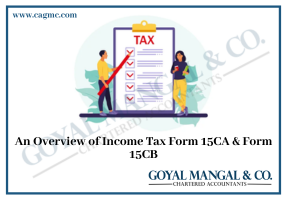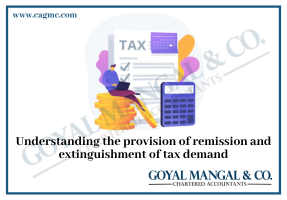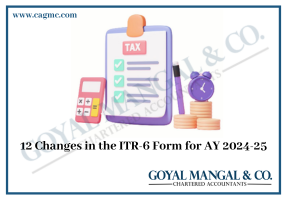
Filing your Income Tax Return (ITR) may seem like a daunting task, but it comes with a host of incredible benefits that can transform your financial landscape. Embrace the power of financial responsibility as we dive into the five extraordinary benefits of filing ITR. From maximizing your tax refunds to building a strong financial profile, this simple act is the key to a brighter and more secure future. Learn how filing ITR returns can be your stepping stone to a financially empowered life! In this article we are going to read about benefits of filing Income Tax Returns.
What is an Income Tax Return?
ITR is an income tax return form that people use to declare their income and assets to the IT department in India. It contains information about the financial transactions of taxpayers. ITR is basically a self-declaration by taxpayers of their earnings, assets, refunds to be claimed, and appropriate taxes paid. While it is usually completed electronically, senior citizens can also do it manually. There are many benefits of filing ITR which are provided to the person filing there ITR on time which we are going to study in the below article.
Who needs to file Income Tax Return?
Not everyone needs to file an ITR. Taxpayers can decide whether they need to file an ITR based on various variables. However, filing an ITR is mandatory if you satisfy any of the following conditions:
- A person whose income exceeds the basic exemption limit of 2.5 lakhs, 3 lakhs, or 5 lakhs as per the applicable taxable limit
- A person who owns assets outside India and has a source of income from outside India must file an ITR.
- Anyone who pays more than 1 lakh in electricity bills in a financial year must file an income tax return.
- Assesses who deposit more than Rs. 1 crore in one or more bank accounts in a financial year must file an ITR.
- International travel expenses: If you spend more than Rs. 2 lakh on foreign travel during the financial year, you should file an income tax return.
However, as mentioned earlier, there are many benefits to filing Income Tax Returns on time. Therefore, it is imperative that you file your ITR, irrespective of whether you fall under the category of taxpayer or not.
Consequences of not filing Income Tax Return
- If a person falls into the taxable slab, he will receive an income tax notice.
- If a person cannot file an IT return due to valid reasons, the authorized body will accept the detailed letter and supporting documents. In such a case, he can apply for amnesty relief.
- In the case of late filing of the ITR, the IT department will levy a penalty on the person. Generally, if a person’s income exceeds Rs. 5 lakh, he has to bear a penalty of Rs. 10,000. If the income is less than this amount, the penalty is Rs. 1,000.
- In serious situations like tax evasion, taxpayers can be punished with rigorous imprisonment.
However, there are some individuals who are not required to file income tax returns. As announced by the Finance Minister in the Union Budget 2021, senior citizens above 75 years of age can get a complete exemption from ITR filing.
Due date of filing Income Tax Returns
To avail the benefits of filing ITR, it is highly recommended to file your tax return on time. Generally, the deadline for filing income tax returns for a given financial year is July 31 for unaudited files and individuals and September 31 for audited files.
Benefits of e-filing of Income Tax Return

- Getting a refund: If tax was deducted on a payment you made and you want to claim a refund, you need to file an ITR for the financial year in which the refund is processed.
- Proof of Identity: When applying for a loan, your eligibility is determined based on your annual income. An ITR form with income details gives the borrower a clear picture of their past income and makes their application more valid. Similarly, a visa application also requires proof of income, but a tax return is the most acceptable proof.
- Proof of income: While buying a term plan, the insurance company may require an ITR to determine the amount of cover that will be paid to the nominee in case of death or disability. ITR is considered an official, verifiable proof of income.
5 benefits of filing Income Tax Returns
Following are the 5 advantages of ITR filing:
- Maximize your tax refund: One of the most important benefits of filing an ITR return is the possibility of a tax refund. Many taxpayers are unaware of the various deductions and exemptions available to them, which can lead to overpayments of taxes throughout the year. Diligently documenting your expenses and investments paves the way for claiming legitimate tax credits, resulting in higher tax refunds. These repayments can be added to the family budget and enable investment, savings, or fulfilling personal wishes.
- Creating financial credibility: Filing an ITR return will go a long way towards building a strong financial profile. Lenders and financial institutions often check ITR documents to assess an individual’s creditworthiness. A proven record of tax compliance makes you a responsible borrower and secures loans, mortgages, and credit cards with favorable terms. In addition, a strong financial profile helps with various life milestones, such as renting a property, applying for a visa, or even finding a job.
- Access to economic opportunities: The ITR is more than just a document for tax authorities. It acts as a financial statement that shows your income, investments, and savings. Filing regular returns provides evidence of financial stability and transparency. This document may open the door to various financial opportunities, such as investment, partnership, and business expansion. Many business deals and collaborations may require clean tax records, making ITR filing an integral part of professional development.
- Helping nation-building: It is easy to focus on personal interests, but remember the larger purpose of filing an ITR return. By fulfilling your tax obligations, you play an important role in supporting the growth and development of your country. Taxes are the lifeblood of any country’s economy and enable governments to fund critical infrastructure projects, health care, education, and social welfare programmes. By filing your ITR return diligently, you are making a positive contribution to the progress and prosperity of your country.
- To avoid punishment and legal issues: Failure to file an ITR on time can lead to heavy penalties and legal trouble. By filing your returns on time, you can prove that you are complying with tax laws and ensure that you are complying with the law and as a result enjoying the benefits of filing Income Tax Returns. This responsible tax filing practice frees us from unnecessary financial burden and legal entanglements and allows us to focus on achieving our financial goals without fear of punitive consequences.
Documents required for filing Income Tax Return
When you start the process of filing your income tax return, apart from your salary slip, bank savings account passbook, Aadhaar card, and PAN card, you will need some other documents to facilitate your tax filing process:
- Form 16: It is provided by your employer and contains the details of the salary paid to you by them and the tax deducted (TDS) on it.
- Form 16A: It contains details on TDS deducted on interest received from deposits like fixed or recurring bank deposits.
- Form 16B: This contains the TDS details of the amount received by a seller from the buyer during the sale of land.
- Form 16C: This contains the TDS (Tax Deduction at Source) details of the rent paid by the tenant to their landlords.
- Form 26AS: This form represents a comprehensive tax statement against your PAN number. It includes TDS by your employer, bank, or any other organization that has paid you. Advance tax or self-assessment tax paid, proof of tax-saving investments such as life insurance policies or term plans from sections 80C to 80U, and prescribed deductions are also listed.
Precautions and other consequences
The Income Tax Act, 1961, also includes provisions for prosecution and other consequences in cases of willful non-compliance or fraud. If a taxpayer intentionally fails to file an income tax return or furnishes false information, he may face legal action, which may include prosecution, imprisonment, or both, along with fines.
It is important for taxpayers to understand their obligations under the Income Tax Act, 1961, and follow the specified timelines for filing income tax returns. Timely compliance not only helps in avoiding penalties but also ensures a smooth tax filing process and maintains the integrity of the taxation system.
Takeaway
Filing Income Tax Returns is not just a legal obligation but a powerful tool for financial empowerment. The benefits of ITR extend beyond the immediate benefits of tax refunds, providing a foundation for financial credibility, opportunities, and security. Adopt responsible Tax filing practice’s, and you’ll find a world of financial prosperity and peace of mind. Remember, by fulfilling your tax obligations, you not only contribute to a brighter future for yourself but also to the progress of the nation.







